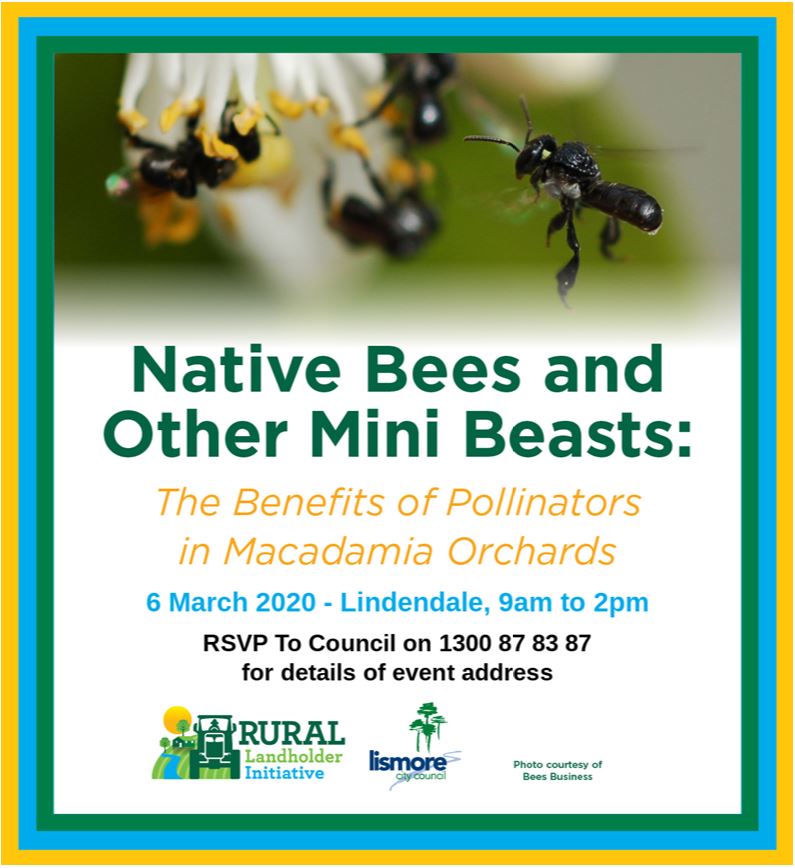- HOME
- NEWS
- EVENTS
- INDUSTRY RESOURCES
In The Orchard
- Biology
- Canopy management
- Environment
- Growing guides & manuals
- Harvest, post-harvest handling & quality
- Irrigation & drainage management
- Nutrition & soil health
- Orchard floor management
- Pests & diseases & crop protection
- Pollination
- Productivity, business & finance
- Varieties, propagation & new plantings
This is a search area with something cool written - SUPPLIERS
- FACTS & FIGURES
- LEVY FUNDED PROJECTS
- CONTACT US
- SHOP
- ABOUT
- MEMBERSHIP
- CLASSIFIEDS
Free field day for Macadamia Growers Buzzing about Native Bees As Pollinators
30 January 2020
 As part of the “Stingless bees as effective managed pollinators for Australian horticulture” project, native bee specialists will be presenting this field day to help Macadamia growers understand the role native bees and other pollinators have in crop pollination. With information sharing presentations, Q&A opportunities, a farm walk, insect hunts (yes you get a net) and demonstration of native bee management, this event is sure to leave you buzzing.
As part of the “Stingless bees as effective managed pollinators for Australian horticulture” project, native bee specialists will be presenting this field day to help Macadamia growers understand the role native bees and other pollinators have in crop pollination. With information sharing presentations, Q&A opportunities, a farm walk, insect hunts (yes you get a net) and demonstration of native bee management, this event is sure to leave you buzzing.
Presenters include local growers who will showcase their approaches to increasing diversity in orchard management. They are joined by macadamia industry IPM specialists Jarrah Coates and Richard Llewelyn, native bee keeper Steve Maginnity, Dr Megan Halcroft of Bees Business, Jacqui Paine of BACK 2 BUSH and a hive of researchers from the Western Sydney University’s Hawkesbury Institute for the Environment.
“Honey bees are excellent pollinators of many crops, but the burden placed on their health by pests and diseases is heavy. Added to that, the looming threat of a Varroa mite incursion makes our reliance on honey bees for pollination decidedly risky” says Dr Halcroft.
In this context, the Hawkesbury Institute for the Environment at Western Sydney University is heading up the Hort Innovation project “Stingless bees as effective managed pollinators for Australian horticulture”. The project’s overall objective is to investigate and develop potential alternative, native insect pollinators for use in horticultural crops. The leading candidates are stingless bees, because they can be managed in hives, just as honey bees are, and moved into crops as required. Native stingless bees live in colonies and visit a variety of plants. We already know that where they are used in macadamia crops, their pollination services outperform honeybees. This field day will expand on how growers can optimise the health and wellbeing of native stingless bees in the orchard environment.
Presentation topics will include:
- The importance of pollination
- How native bees and other pollinators perform their services
- The value of insect pollinators to the industry
- Potential problems we will face if/when Varroa mite arrives in Australia and how we can prepare
- Demonstration of Interrow management for floristic diversity and how to achieve Integrated Pest Management
- Practical examples of the importance of supporting native bee populations, through plantings and habitat conservation, and how this will support all pollinating insects to ensure their presence during crop bloom.
A delicious local produce-filled lunch will follow a walk and talk on the properties. Researchers will help you get up close and personal with the insects in the orchard, with nets and jars. We’ll see inside a stingless bee hive and hear from a local grower how native bees have enhanced their enterprise.
CLICK HERE FOR THE NORTHERN RIVERS EVENT DETAILS
This event is organized by Lismore City Council with Western Sydney University Hawkesbury Institute for the Environment and is sponsored by Hort Innovation.
This is one of two events in the Richmond Catchment aiming to improve awareness of the potential of native insect pollinators for use in horticultural crops. The workshops will be delivered in conjunction with Western Sydney University and are sponsored by Hort Innovation. Richmond Landcare Inc is hosting a similar day for Avocado growers on 5 March 2020 at Alstonville, 9am to 2pm including lunch and refreshments. Growers can register for the avocado event via eventbrite https://avocadosnativebeesfieldday.eventbrite.com
Our Events
Proudly Supported By

This website has been partly funded by Hort Innovation, using the macadamia research and development levy and contributions from the Australian Government.





